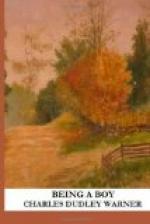goes along the road; and there is a girl in the carriage
who looks out at John, who is suddenly aware that
his trousers are patched on each knee and in two places
behind; and he wonders if she is rich, and whose name
is on the trunk, and how much the horses cost, and
whether that nice-looking man is the girl’s
father, and if that boy on the seat with the driver
is her brother, and if he has to do chores; and as
the gay sight disappears, John falls to thinking about
the great world beyond the farm, of cities, and people
who are always dressed up, and a great many other
things of which he has a very dim notion. And
then a boy, whom John knows, rides by in a wagon with
his father, and the boy makes a face at John, and
John returns the greeting with a twist of his own
visage and some symbolic gestures. All these things
take time. The work of cutting down the big weeds
gets on slowly, although it is not very disagreeable,
or would not be if it were play. John imagines
that yonder big thistle is some whiskered villain,
of whom he has read in a fairy book, and he advances
on him with “Die, ruffian!” and slashes
off his head with the bill-hook; or he charges upon
the rows of mullein-stalks as if they were rebels
in regimental ranks, and hews them down without mercy.
What fun it might be if there were only another boy
there to help. But even war, single handed, gets
to be tiresome. It is dinner-time before John
finishes the weeds, and it is cow-time before John
has made much impression on the garden.
This garden John has no fondness for. He would
rather hoe corn all day than work in it. Father
seems to think that it is easy work that John can
do, because it is near the house! John’s
continual plan in this life is to go fishing.
When there comes a rainy day, he attempts to carry
it out. But ten chances to one his father has
different views. As it rains so that work cannot
be done out-doors, it is a good time to work in the
garden. He can run into the house between the
heavy showers. John accordingly detests the garden;
and the only time he works briskly in it is when he
has a stent set, to do so much weeding before the
Fourth of July. If he is spry, he can make an
extra holiday the Fourth and the day after. Two
days of gunpowder and ball-playing! When I was
a boy, I supposed there was some connection between
such and such an amount of work done on the farm and
our national freedom. I doubted if there could
be any Fourth of July if my stent was not done.
I, at least, worked for my Independence.
III
THE DELIGHTS OF FARMING




